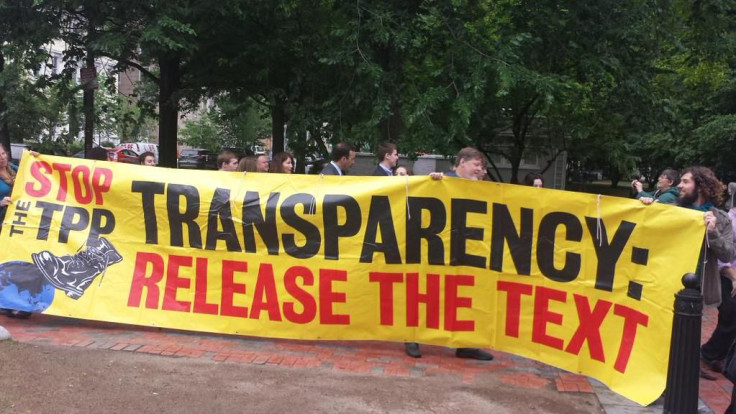Trans-Pacific Partnership 2015: DC Protesters Demand To See TPP Text, Rebuffed By Obama Administration, Police

In the latest escalation of its campaign against the Trans-Pacific Partnership (TPP), the nation's largest labor federation is calling on the Obama administration to declassify the full text of the proposed trade agreement. And on a rainy Tuesday morning in Washington, the AFL-CIO and its allies engaged in some old-fashioned political theater to make their point.
As it stands, access to the deal is limited to negotiators and, upon special request, members of Congress, all of whom are legally barred from disclosing the details. Those strict rules remain in place even as the White House lobbies the House of Representatives on so-called fast-track legislation. The bill would prevent lawmakers from amending the version of the trade deal finalized by negotiators and is widely seen as a prerequisite to passage of the treaty, which would link the United States with 11 other Pacific Rim countries, including Japan, Australia and Singapore. (The Senate passed fast-track last month, and an extremely tight House vote is expected soon.)
Labor unions are among the fiercest critics of the proposed treaty, which they say will lead to domestic job loss, undermine public interest laws and further empower multinational corporations. Some of them are on advisory committees and have therefore seen proposals from U.S. negotiators, even if they cannot disclose details publicly. “We would be in violation of the law and would face penalties,” AFL-CIO deputy chief of staff Thea Lee said. “We would also certainly lose our security clearance, hampering our ability to engage in future trade discussions.”
President Barack Obama has pushed back against critics who cite transparency concerns -- at one point, accusing Sen. Elizabeth Warren, D-Mass., of politically motivated fearmongering. Recently, the president said “there’s nothing secret about” the deal and anyone “can walk over today and read the text of the agreement.” On Tuesday, opponents decided to give it a try.
Joined by environmentalists, faith leaders and two members of Congress -- Reps. Rosa DeLauro, D-Conn., and Lloyd Doggett, D-Texas -- dozens of unionists and sympathizers rallied outside the AFL-CIO’s headquarters in downtown Washington, calling on the administration to release the agreement publicly. Then, amid of chants of “show us the jobs, show us the text,” the crowd marched several blocks to the Office of the United States Trade Representative (USTR), where a smaller group knocked on the agency’s closed doors and demanded to see a copy of the Pacific agreement.
Nobody answered.
American citizens not allowed to enter @USTradeRep office to read TPP #StopFastTrack pic.twitter.com/5SjWcm8Q0e
— AFL-CIO (@AFLCIO) June 2, 2015Then, police from the Department of Homeland Security arrived on the scene.
Instead of letting us see the text, the @USTradeRep called the cops on us. This is democracy?! #StopFastTrack #1u pic.twitter.com/p3QOgqScsF
— Andy Richards (@richards_andy) June 2, 2015The USTR did not respond to request for comment.
Pointing to the record of previous deals like the North American Free Trade Agreement and the more recent U.S.-Korea Free Trade Agreement, labor critics say the TPP threatens to destroy union jobs in fields like auto production and steel manufacturing. They also criticize the inclusion of so-called “investor state dispute settlement” provisions, detailed in a chapter leaked by Wikileaks in March. The measures allow corporations to sue governments for breaching the agreement in controversial international trade tribunals.
At the rally, opponents launched familiar critiques of the TPP, casting the deal as a Trojan Horse for the super-rich.
“Which side are you on?” asked Larry Cohen, president of the Communications Workers of America. “Are you on the side of the Chamber of Commerce or the working class of America?”
As the House nears its vote, trade foes are ramping up their opposition. At the Capitol Wednesday, progressive groups and members of Congress were to unveil 2 million signatures against fast-track.
© Copyright IBTimes 2025. All rights reserved.






















